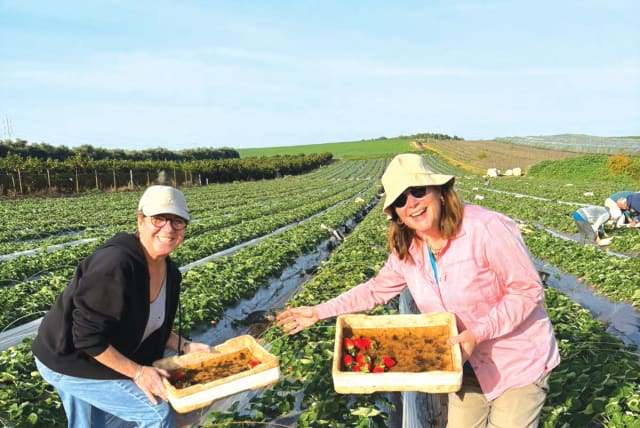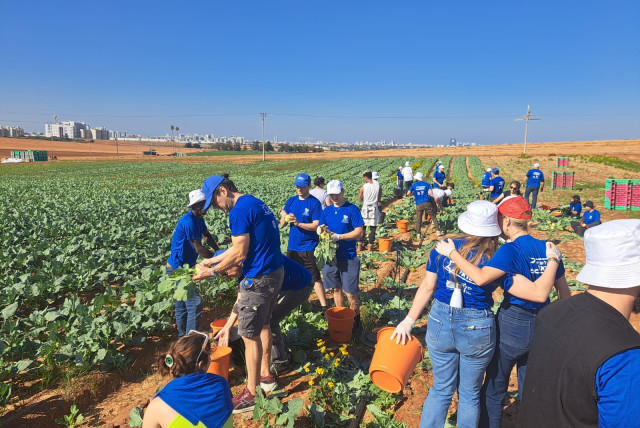Supporting Israeli farmers is essential - opinion

Since October 7, farmers have been grappling with severe shortage of workers, exacerbating other challenges and threatening the livelihoods of farmers and the agricultural sector as a whole.
Since the outbreak of the Israel-Hamas war, I have been actively involved as a volunteer in Israel’s agricultural sector, joining the ranks of tens of thousands of civilians who contribute to the war effort in an unprecedented showing of support for our country during these practically and emotionally difficult times.
From picking strawberries and tangerines to packing figs bound for sale abroad, clipping grape vines at wineries, and assisting in the cultivation of medical cannabis, my endeavors have been a mix of social engagement, physical labor, and sometimes menial work on assembly lines.
Working alongside a volunteer group from my local Jerusalem synagogue, I meet volunteers from across the country – secular and religious Jews, young and not so young – and volunteers from around the world. This adds an important and heartwarming communal aspect to our efforts.
While the farmers we support on kibbutzim, moshavim, and private farms are grateful and welcoming, their faces often betray signs of worry and exhaustion as they navigate intense challenges that extend beyond what volunteers can address. Relying on volunteers to fill the void left by Palestinian and foreign laborers is unsustainable and underscores the urgent need for long-term solutions.
Shortage of workers
Since October 7, farmers have been grappling with severe shortage of workers, exacerbating other challenges and threatening the livelihoods of farmers and the agricultural sector as a whole. The sector heavily relies on Palestinians from beyond the Green Line and foreign workers from countries such as Thailand and the Philippines to plant, harvest, and maintain crops. However, border restrictions imposed during the conflict have severely limited the entry of local and foreign laborers, leaving farmers in a precarious position.
The absence of workers has led to a significant drop in productivity, with crops going unharvested and fields left untended, resulting in financial losses and potential food shortages. Farmers are burdened with increased workloads as they strive to compensate for the missing workforce and are dealing with many of the same issues as all Israelis – loss of loved ones, family members who are serving in the IDF as conscripts or reservists, family members who have been evacuated from their homes and have lost their own incomes, often without compensation from the government.
To address the immediate labor shortage, the government can work toward easing border restrictions to allow the entry of foreign workers while ensuring adherence to health and safety protocols. There are indeed foreign workers trickling back in, and there is talk of bringing in significant numbers of workers from India. Investing in initiatives to attract and train local workers for agricultural jobs can help alleviate the crisis and create employment opportunities. Such programs have already been developed, but they are clearly not enough.
The challenges faced by Israeli farmers during the Israel-Hamas war extend beyond the labor shortage. Damage to agricultural infrastructure and disruptions in supply chains, economic instability, and, as mentioned, psychological stress are additional hurdles that farmers must navigate.
Addressing these challenges requires support from local and international communities to ensure the sector’s sustainability and resilience. In one initiative brought to my attention, the American Jewish community is donating funds directly to farmers whose equipment was rendered unusable during the war, because their insurance companies will compensate them for only half the amount of their losses.
According to the University of Haifa’s Ruderman Program for American Jewish Studies, US Jewry has raised over $1 billion for Israel since the outbreak of the war. That some of these funds is going to aid farmers is a vital and welcome source of support.
While the exact number of local volunteers in the agriculture sector is unknown, our collective efforts signify a strong sense of community and solidarity in times of crisis. Our contributions, and those of all the volunteers in so many ways – e.g., in education, collecting goods, and cooking for the displaced and for soldiers, using professional abilities to help with mental health problems – reflect the unity and determination of the Israeli people during this time of ongoing crisis. Civil society in Israel has risen to the occasion in magnificent ways that will be remembered and studied for years to come.
While looking forward to the end of the war and the return of the experienced workers the farmers really need, I value the time spent meeting the hardworking farmers, whose livelihoods are genuinely at stake, and learning about Israel’s agricultural sector in ways that were beyond me when I volunteered on kibbutz in my teens.
These farmers deserve our full support and thanks, as they continue to navigate this crisis and strive to provide fresh, healthy, and nutritious food for our tables.
The writer is president of Kam Global Strategies, a strategic communications and public relations company based in Jerusalem.
Jerusalem Post Store
`; document.getElementById("linkPremium").innerHTML = cont; var divWithLink = document.getElementById("premium-link"); if (divWithLink !== null && divWithLink !== 'undefined') { divWithLink.style.border = "solid 1px #cb0f3e"; divWithLink.style.textAlign = "center"; divWithLink.style.marginBottom = "15px"; divWithLink.style.marginTop = "15px"; divWithLink.style.width = "100%"; divWithLink.style.backgroundColor = "#122952"; divWithLink.style.color = "#ffffff"; divWithLink.style.lineHeight = "1.5"; } } (function (v, i) { });

